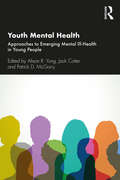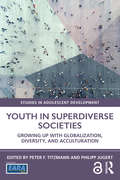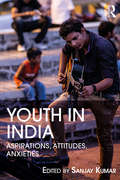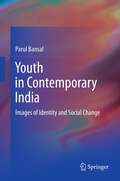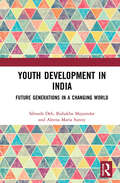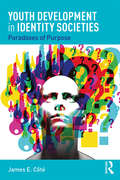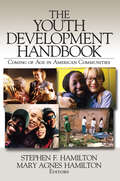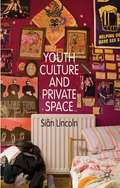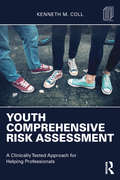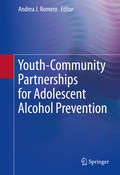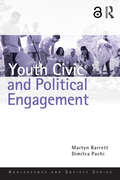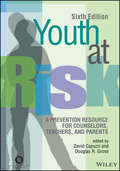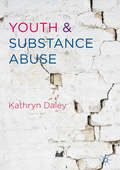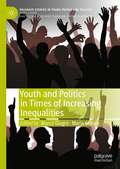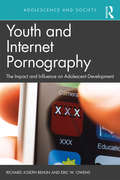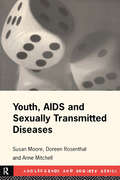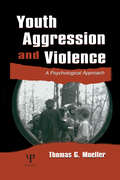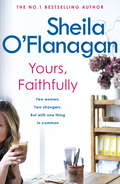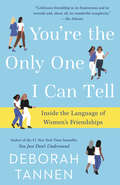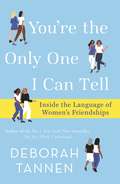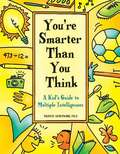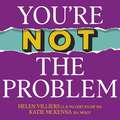- Table View
- List View
Youth Mental Health: Approaches to Emerging Mental Ill-Health in Young People
by Alison R. Yung Jack Cotter Patrick D. McGorryThis book highlights the field of youth mental health and why it is a specialty distinct from both child and adolescent and adult mental health. Youth Mental Health: Approaches to Emerging Mental Ill-Health in Young People examines issues such as mental health literacy, e-Health, family, psychological, vocational and pharmacological interventions. The authors also discuss issues that are particularly pertinent to young people, such as suicidality, substance abuse, gender identity and sexuality, attention deficit disorder and eating disorders. Taking a preventative focus, this book presents evidence for youth mental health as an important and growing field, makes the case for the reform of existing service structures to better serve this group and outlines the latest specialised approaches to treatment. Drawing on the knowledge and expertise of leading thinkers in youth mental health, this book is instrumental for mental health professionals who wish to design new specialised mental health systems for young people.
Youth in Superdiverse Societies: Growing up with globalization, diversity, and acculturation (Studies in Adolescent Development)
by Peter Titzmann Philipp JugertYouth in Superdiverse Societies brings together theoretical, methodological and international approaches to the study of globalization, diversity, and acculturation in adolescence. It examines vital issues including migration, integration, cultural identities, ethnic minorities, and the interplay of ethnic and cultural diversity with experiences of growing up as an adolescent. This important volume focuses on understanding the experiences and consequences of multicultural societies and offers valuable new insights in the field of intergroup relations and the complexity of growingly heterogeneous societies. The book comprises four sections. The first includes fresh theoretical perspectives for studying youth development in multicultural societies, exploring topics such as superdiversity, globalization, bicultural identity development, polyculturalism, the interplay of acculturation and development, as well as developmental-ecological approaches. The second section highlights innovative methods in studying multicultural societies. It contains innovative dynamic concepts (e.g., experience-based sampling), methods for studying the nested structure of acculturative contexts, and suggestions for cross-comparative research to differentiate universal and context-specific processes. The third section examines social relations and social networks in diverse societies and features developmentally crucial contexts (e.g., family, peers, schools) and contributions on interethnic interactions in real-life contexts. The final section presents applications in natural settings and includes contributions on participatory action research and teachers dealings' with ethnic diversity. Each chapter provides a thorough overview of current research trends and findings, followed by detailed recommendations for future research, suggesting how the approaches can be cited, applied and improved. Youth in Superdiverse Societies is valuable reading for students studying adolescent acculturation and development in psychology, sociology, education, anthropology, linguistics and political science. It will also be of interest to scholars and researchers in social and developmental psychology, and related disciplines, as well as professionals in the field of migration.
Youth in India: Aspirations, Attitudes, Anxieties
by Sanjay KumarThis book explores the attitudes, anxieties and aspirations of India’s burgeoning young population in a globalised world. Drawing upon time-series survey data of the Indian youth aged between 15 and 34 years across 19 Indian states, it provides key insights into a range of themes along with an overview of the changing trends and patterns of their behaviour. The volume examines the job preferences of the Indian youth, their career priorities and opinions on reservations in employment and education sectors. It measures their degree of political participation and studies their attitude regarding political issues. It looks at aspects relating to their social and cultural contexts, preferences and practices, including lifestyle choices, consumption habits and social customs such as marriage, as they negotiate between tradition and modernity. Further, it discusses the anxieties and insecurities that the youth face, their mental health and their experiences of social discrimination. The essays here offer an understanding of a critical demographic and shed light on the challenges and opportunities that the Indian youth confront today. Lucid, accessible and empirically grounded, this volume will be useful to scholars and researchers of sociology, political sociology, political studies, youth psychology and anthropology as well as policymakers, journalists and the interested general reader.
Youth in Contemporary India
by Parul BansalThis book endeavors to be a study of identity in Indian urban youth. It is concerned with understanding the psychological themes of conformity, rebellion, individuation, relatedness, initiative and ideological values which pervade youths' search for identity within the Indian cultural milieu, specifically the Indian family. In its essence, the book attempts to explore how in contemporary India the emerging sense of individuality in youth is seeking its own balance of relationality with parental figures and cohesion with social order. The research questions are addressed to two groups of young men and women in the age group of 20-29 years-Youth in Corporate sector and Youth in Non Profit sector. Methodologically, the study is a psychoanalytically informed, process oriented, context sensitive work that proceeds via narrations, conversations and in-depth life stories of young men and women. Overall, the text reflects on the nature of inter-generational continuity and shifts in India.
Youth Development in India: Future Generations in a Changing World
by Sibnath Deb Bishakha Majumdar Aleena Maria SunnyThis book provides a comprehensive understanding of youth development and protection in the Indian context. It reviews the demographic and socio-economic background and future prospects of Indian youth. The book discusses the role of family and culture in the upbringing and development of youth, changing political and socio-economic situations, and the influence of parents and teachers in shaping the future of the youth. The book highlights the nature of adversities faced by children and youth and the subsequent impact on their mental health and well-being. It also examines the efficacy of various skill development programmes and national and international policies designed for the youth. The book will be of interest to students, teachers, and researchers of population sciences, population studies, psychology, childhood studies, development studies, sociology, and youth studies. It will also be of interest to policymakers and NGOs working with children and youth.
Youth Development in Identity Societies: Paradoxes of Purpose
by James E. CoteThis book explores the causes and consequences of the contradictions in young people’s lives stemming from the affluence–purpose paradox: a lack of purpose-in-life among many of those living in the most affluent societies in human history. This paradox is endemic to identity societies where people experience a choice-contingent life course, and is examined using an interdisciplinary approach—largely with an integration of developmental psychology and sociology, but also using historical, anthropological, economic, and political perspectives. The transition to adulthood is now commonly a prolonged process, with young people facing a number of psychological challenges and sociological obstacles in their identity formation. Challenges include difficulties in making prudent choices about goals. Obstacles involve cross-pressures in the wider society as well as in educational institutions. Consequently, many youth experience their education as alienating and stressful rather than as an opportunity for personal development. Those without a sense of purpose have more difficulties with their identity formation that can produce symptoms of anxiety and depression. The current student mental health crisis is examined in this context. An additional challenge is an ambiguously defined adulthood. Young people who are confused about appropriate adult roles often value hedonistic activities rooted in narcissism and materialism rather than in more fulfilling long-term goals. Conversely, those who are agentic in their personal development can thrive in adulthood, especially when they combine agency with generativity. This book ends with a series of recommendations for researchers and policy makers to help youth cope with the affluence–purpose paradox.
The Youth Development Handbook: Coming of Age in American Communities
by Stephen F. Hamilton Dr Mary Agnes HamiltonWhat are the types of environments in which youth thrive? How do we cultivate such environments to promote optimal development and positive behavior in youth? The Youth Development Handbook: Coming of Age in American Communities provides youth and development practitioners access to current theory and research in the field of youth development, including illustrations of good practice, original case studies, and a contextual approach to such topics as youth participation and diversity. The Youth Development Handbook is designed for scholars and researchers in applied developmental science as well as practitioners and policy makers who implement youth development initiatives. The book is also recommended for use in graduate courses on youth development in the fields of Psychology, Human Development & Family Studies, and Education.
Youth Culture and Private Space
by Siân LincolnSi#65533;n Lincoln considers the use, role and significance of private spaces in the lives of young people. Drawing on extensive ethnographic research, she explores the place of 'the private' in youth cultural discourses, both historically and contemporarily, that until now have remained largely absent in youth cultural research.
Youth Comprehensive Risk Assessment: A Clinically Tested Approach for Helping Professionals
by Kenneth M. CollYouth Comprehensive Risk Assessment: A Clinically Tested Approach for Helping Professionals presents a complete youth risk assessment and treatment program based on Dr. Ken Coll's 20 plus years of research on assessing and treating at-risk youth. In this book, helping professionals will find not only a wide range of succinct and easy-to-use assessments, but also proven helpful, highly specific approaches and treatment strategies. Case studies and intervention techniques show professionals—from therapists and social workers to teachers and nurses—how they can help struggling youth find motivation to work on their concerns. This book also offers professionals a menu of assessment surveys and action strategies so that they can develop a plan that best fits the needs of particular youth and their families.
Youth-Community Partnerships for Adolescent Alcohol Prevention
by Andrea J. RomeroThis forward-thinking reference spotlights an expansive and inclusive community model for youth alcohol prevention as opposed to traditional individual and school-based group approaches. Focusing on a long-term intervention in a Southwestern border town, it documents the development of critical consciousness in an affected community, and emphasizes young people as crucial drivers of change in their environment. The book's Community Readiness Model provides vital context for successful coalition building between youth, families, and community entities (e. g. , schools, civic leaders, police) in reducing alcohol risk factors and promoting healthier choices. Given the severity and prevalence of youth alcohol use, this case study offers a viable blueprint for large-scale engagement in prevention. Among the featured topics: Integrating research into prevention strategies using participatory action research. Breaking down silos between community-based organizations: coalition development. Adult perspectives on nurturing youth leadership and coalition participation. Youth perspectives on youth power as the source of community dev elopment. Coalition as conclusion: tips on creating a functioning coalition. Community transformational resilience for adolescent alcohol prevention. Youth-Community Partnerships for Adolescent Alcohol Prevention is both practical and inspiring reading for researchers and other mental health professionals in psychology, social work, and public health who work with adolescents, communities, and civic engagement.
Youth Civic and Political Engagement (Adolescence and Society)
by Martyn Barrett Dimitra PachiWhat exactly is civic and political participation? What factors influence young people’s participation? How can we encourage youth to actively participate in their own democracies? Youth Civic and Political Engagement takes a multidisciplinary approach to answering these key questions, incorporating research in the fields of psychology, sociology, political science and education to explore the issues affecting youth civic and political engagement. Drawing on evidence that has been obtained in many different national contexts, and through multinational studies, this book provides a theoretical synthesis of this large and diverse body of research, using an integrative multi-level ecological model of youth engagement to do so. It identifies unresolved issues in the field and offers numerous suggestions for future research. Youth Civic and Political Engagement is an invaluable resource for researchers, teachers, youth workers, civil society activists, policymakers and politicians who wish to acquire an up-to-date understanding of the factors and processes that influence young people’s civic and political engagement, and how to promote youth engagement.
Youth Civic and Political Engagement (ISSN)
by Martyn Barrett Dimitra PachiWhat exactly is civic and political participation? What factors influence young people’s participation? How can we encourage youth to actively participate in their own democracies? Youth Civic and Political Engagement takes a multidisciplinary approach to answering these key questions, incorporating research in the fields of psychology, sociology, political science and education to explore the issues affecting youth civic and political engagement.Drawing on evidence that has been obtained in many different national contexts, and through multinational studies, this book provides a theoretical synthesis of this large and diverse body of research, using an integrative multi-level ecological model of youth engagement to do so. It identifies unresolved issues in the field and offers numerous suggestions for future research.Youth Civic and Political Engagementis an invaluable resource for researchers, teachers, youth workers, civil society activists, policymakers and politicians who wish to acquire an up-to-date understanding of the factors and processes that influence young people’s civic and political engagement, and how to promote youth engagement.Chapters 1, 2, 3, and 4 of this book are freely available as downloadable Open Access PDFs at http://www.taylorfrancis.com under a Creative Commons Attribution-Non Commercial-No Derivatives (CC-BY-NC-ND) 4.0 license.
Youth at Risk: A Prevention Resource for Counselors, Teachers, and Parents
by David Capuzzi Douglas R. GrossIn the latest edition of this best-selling text, David Capuzzi and Douglas Gross, along with 24 experts in the field provide a prevention–intervention paradigm to address contemporary issues facing today’s youth. Written from a systemic perspective, this book offers guidance in helping teens who are struggling with the complex challenges that can be brought on by peers, family members, and difficult social environments. Part 1 presents information on at-risk population identification, causal factors of problematic behaviors, and promotion of resiliency in youth. Part 2 examines the development of at-risk behaviors relating to dysfunctional family dynamics, low self-esteem, depression, mood disorders, and stress and trauma. Part 3 explores the behaviors most often identified as placing youth at risk, such as eating disorders, suicidal preoccupation, teen sexuality, gang membership, school violence, substance abuse, homelessness, school dropout, and bullying, as well as the unique strengths of and stressors faced by multiracial and LGBTQ youth. Case studies illustrate prevention efforts from individual, family, school, and community perspectives, and text sidebars create greater reader self-awareness and enhance the understanding of the concepts, skills, and applications of the chapter material. A complimentary test manual and PowerPoint slides for instructors’ use are available by written request to ACA. *Requests for digital versions from the ACA can be found on wiley.com. *To request print copies, please visit the ACA website here. *Reproduction requests for material from books published by ACA should be directed to permissions@counseling.org.
Youth and Substance Abuse
by Kathryn DaleyThis book provides a sociological examination of young people's pathways into, and out of, substance abuse. Drawing from in-depth, life-history interviews with over sixty young people who have experienced problematic drug use, the author uses participants' narratives to throw light on the relationship between trauma and issues such as homelessness, crime and self-injury. Contesting the view that substance abuse is either a medical issue or individual failing, the book examines the wide variety of factors which lead to youth substance abuse such as extreme poverty and other structural factors. Whilst it does not overlook individual agency, the rich descriptions from young people's oral histories show us that the contexts in which agency was exercised, was often considerably constrained by significant structural forces. The sociological concept of 'situated choice', which is used to explain and understand how people make choices within their individual context, is used throughout the book as we witness young people wrestling to escape intergenerational disadvantage. The book will be of interest to scholars and students of Social Work, Social Policy, Youth Studies, Sociology and Health Studies.
Youth and Politics in Times of Increasing Inequalities (Palgrave Studies in Young People and Politics)
by Marco Giugni Maria GrassoYoung people are very often the driving forces of political participation that aims to change societies and political systems. Rather than being depoliticized, young people in different national contexts are giving rise to alternative politics. Drawing on original survey data collected in 2018, this edited volume provides a detailed analysis of youth participation in nine European countries by focusing on socialization processes, different modes of participation and the mobilization of youth politics. "This volume is an indispensable guide to understanding young European’s experience and engagement of politics, the inequalities that shape young people’s political engagement and are sometimes replicated through them, and young people’s commitment to saving the environment and spreading democratic ideals. Based on compelling and extensive research across nine nations, this volume makes important advances in key debates on youth politics and provides critical empirical insights into which young people engage, influences on young people’s politics, how young people engage, why some young people don’t engage, and trends across nations. The volume succeeds in the herculean task of focusing on specific national contexts while also rendering a comprehensive picture of youth politics and inequality in Europe today."—Jennifer Earl, Professor of Sociology, University of Arizona, USA "Forecasts by social scientists of young people’s increasingly apathetic stance towards political participation appear to have been misplaced. This text, drawing data and analysis across and between nine European countries, captures the changing nature of political ‘activism’ by young people. It indicates how this is strongly nuanced by factors such as social class and gender identity. It also highlights important distinctions between young people’s approaches towards more traditional (electoral) and more contemporary (non-institutional) forms of participation. Critically, it illuminates the many ways in which youth political participation has evolved and transformed in recent years. Wider social circumstances and experiences are identified as highly significant in preparing young people for, and influencing their levels of participation in, both protest-oriented action and electoral politics."—Howard Williamson, Professor of European Youth Policy, University of South Wales, UK "This book is an incredible guide to understanding the role and sources of inequalities on young people’s political involvement. Country specific chapters allow the authors to integrate a large number of the key and most pressing issues regarding young people’s relationship to politics in a single volume. Topics range from social mobility and the influence of socioeconomic (parental) resources and class; young people’s practice in the social sphere; the intersection of gender with other sources of inequalities; online participation and its relationship with social inequalities; the impact of harsh economic conditions; the mobilization potential of the environmental cause; to the role of political organizations. Integrating all these pressing dimensions in a common framework and accompanying it with extensive novel empirical evidence is a great achievement and the result is a must read piece for researchers and practitioners aiming to understand the challenges young people face in developing their relationship to politics."—Gema García-Albacete, Associate Professor of Political Science, University Carlos III Madrid, Spain
Youth and Internet Pornography: The impact and influence on adolescent development (Adolescence and Society)
by Richard Joseph Behun Eric OwensThis much-needed book provides an in-depth, nonjudgmental look at how consumption of Internet pornography and sexually explicit Internet material (SEIM) impacts the social, physical, emotional, and sexual development of adolescents. Youth and Internet Pornography explores some of the most contemporary issues in this field, including deepfake technology, the long-standing conflict between legal challenges to pornography versus individual rights, and the interrelationship between adolescent use of Internet pornography and the larger culture. The text outlines how different generations interact with the Internet, as well as the related legal and ethical issues around working with these different age groups. Behun and Owens use clinical illustrations and guided practice exercises to contextualise theoretical constructs and research, providing a comprehensive guide to how those working with young people should consider the impact of Internet pornography in their day-to-day practice. This book is essential reading for professionals and policy makers hoping to mitigate outcomes in counselling, youth and social work, and education, as well as supplementary reading for courses in human sexuality and development.
Youth, AIDS and Sexually Transmitted Diseases (Adolescence and Society)
by Doreen Rosenthal Susan Moore Anne MitchellWhat has been the impact of AIDS and sexually transmitted diseases on the lives of young people? Youth, AIDS and Sexually Transmitted Diseases provides a comprehensive overview of research and policy in this increasingly important area. The book describes the world-wide incidence and prevalence of sexually transmitted diseases among adolescents and examines how their sexual behaviour has changed as a result of the threat of AIDS. It also looks at young people's knowledge and attitudes about their own sexual health, as well as the usefulness of models in predicting those at risk. The authors also discuss the effectiveness of institutional policies in educating young people and in preventing sexually transmitted diseases. Youth, AIDS and Sexually Transmitted Diseases will be of considerable benefit to health care providers, sex educators and all those who work with and study adolescents.
Youth Aggression and Violence: A Psychological Approach
by Thomas G. MoellerThe rash of school shootings in the late 1990s has generated a tremendous amount of public concern about youth aggression and violence. But students, trainees, and professionals who work with children and adolescents have had no concise or systematic survey of our current knowledge about causes and effective approaches to intervention and prevention on which to draw. Youth Aggression and Violence has filled the void. Comprehensive and readable, it: * utilizes theory and research from the developmental psychology of "normal" children and adolescents, as well as material on "abnormal" forms of development, such as disruptive behavior disorders and juvenile delinquency; * situates youthful aggression and violence within the overall framework of children's moral development; * integrates quantitative research with carefully considered qualitative research and case studies; * discusses the genetic and biological underpinnings of youthful aggression, as well as family and social factors related to antisocial behavior; * emphasizes cognitive, motivational, and emotional processes involved in youth aggression and violence; * provides in-depth coverage of juvenile killers and school violence; * examines female aggression and violence in a variety of contexts; and * critically examines a number of questions frequently discussed in conjunction with youth violence, such as media violence, firearm accessibility, and the relationship between self-esteem and aggression.
Yours, Faithfully: A page-turning and touching story by the #1 bestselling author
by Sheila O'FlanaganSheila O'Flangan's wonderfully gripping, dramatic and touching novel YOURS, FAITHFULLY is essential reading for fans of Marian Keyes and Freya North.Iona Brannock has always been impatient. Not one to hang around, she married her gorgeous husband just months after meeting him and they have lived happily ever since. Now all she needs is a baby and her life will be perfect. Sally Harper has been blissfully married for almost twenty years. She has a beautiful daughter, a loving husband and a great job. Her life is complete. But a surprise pregnancy is about to change everything.Two women - strangers leading separate lives. But their two worlds are about to collide in the most shocking way...What readers are saying about Yours, Faithfully:'This book is simply gorgeous! I love this book, I love the author and I am absolutely going to read more of her stories' Goodreads reviewer, 5 stars'This book put me inside an exquisite bubble of sympathy, suspense and contemplation' Goodreads reviewer, 5 stars'A real page-turner of how lives become intertwined because of one person. An excellent read - I enjoyed every bit of it' Amazon reviewer, 5 stars
Yours, Faithfully: A page-turning and touching story by the #1 bestselling author
by Sheila O'FlanaganSheila O'Flangan's wonderfully gripping, dramatic and touching novel YOURS, FAITHFULLY is essential reading for fans of Marian Keyes and Freya North.Iona Brannock has always been impatient. Not one to hang around, she married her gorgeous husband just months after meeting him and they have lived happily ever since. Now all she needs is a baby and her life will be perfect. Sally Harper has been blissfully married for almost twenty years. She has a beautiful daughter, a loving husband and a great job. Her life is complete. But a surprise pregnancy is about to change everything.Two women - strangers leading separate lives. But their two worlds are about to collide in the most shocking way...What readers are saying about Yours, Faithfully: 'This book is simply gorgeous! I love this book, I love the author and I am absolutely going to read more of her stories' Goodreads reviewer, 5 stars'This book put me inside an exquisite bubble of sympathy, suspense and contemplation' Goodreads reviewer, 5 stars'A real page-turner of how lives become intertwined because of one person. An excellent read - I enjoyed every bit of it' Amazon reviewer, 5 stars
Yours, Faithfully: A page-turning and touching story by the #1 bestselling author
by Sheila O'FlanaganSheila O'Flangan's wonderfully gripping and touching novel YOURS, FAITHFULLY is essential reading for fans of Emily Bleeker and Liane Moriarty. From the bestselling author of THE MISSING WIFE: 'Captivating... A page-turner that does not disappoint' Anne M. Miskewitch, Library Journal.Iona Brannock has always been impatient. Not one to hang around, she married her gorgeous husband just months after meeting him and they have lived happily ever since. Now all she needs is a baby and her life will be perfect. Sally Harper has been blissfully married for almost twenty years. She has a beautiful daughter, a loving husband and a great job. Her life is complete. But a surprise pregnancy is about to change everything.Two women - strangers leading separate lives. But their two worlds are about to collide in the most shocking way...
You're the Only One I Can Tell: Inside the Language of Women's Friendships
by Deborah TannenThis warm, wise exploration of female friendship from the #1 bestselling author of You Just Don’t Understand will help women lean into these powerful relationships. Best friend, old friend, good friend, bff, college roommate, neighbor, workplace confidante: Women’s friendships are a lifeline in times of trouble and a support system for daily life. A friend can be like a sister, daughter, mother, mentor, therapist, or confessor—or she can be all of these at once. She’s seen you at your worst and celebrates you at your best. Figuring out what it means to be friends is, in the end, no less than figuring out how we connect to other people. In this illuminating and validating new book, #1 New York Times bestselling author Deborah Tannen deconstructs the ways women friends talk and how those ways can bring friends closer or pull them apart. From casual chatting to intimate confiding, from talking about problems to telling what you had for dinner, Tannen uncovers the patterns of communication and miscommunication that affect friendships at different points in our lives. She shows how even the best of friends—with the best intentions—can say the wrong thing, and how words can repair the damage done by words. Through Tannen’s signature insight, humor, and ability to present pitch-perfect real-life dialogue, readers will see themselves and their friendships on every page. The book explains • the power of women friends who show empathy, give advice—or just listen • how women use talk to connect to friends—and to subtly compete • how “Fear of Being Left Out” and “Fear of Getting Kicked Out” can haunt women’s friendships • how social media is reshaping communication and relationships Drawing on interviews with eighty women of diverse backgrounds, ranging in age from nine to ninety-seven, You’re the Only One I Can Tell gets to the heart of women’s friendships—how they work or fail, how they help or hurt, and how we can make them better.
You're the Only One I Can Tell: Inside the Language of Women's Friendships
by Deborah TannenA Washington Post Notable Book of 2017.Deborah Tannen's bestselling You Just Don't Understand: Conversations Between Women and Men made us aware of the deep and subtle meanings behind the words we say. She has since explored the way we talk at work, in arguments, to our mothers and our daughters.Now she turns to that most intense, precious and potential minefield: women's friendships.Best friend, old friend, good friend, new friend, neighbour, fellow mother at the school gate, workplace confidante: women's friendships are crucial. A friend can be like a sister, daughter, mother, mentor, therapist or confessor. She can also be the source of pain and betrayal.From casual chatting to intimate confiding, from talking about problems to sharing funny stories, there are patterns of communication and miscommunication that affect friendships. Tannen shows how even the best of friends - with the best intentions - can say the wrong thing, how the ways women friends talk can bring friends closer or pull them apart, but also how words can repair the damage done by words. She explains the power of women friends who show empathy and can just listen; how women use talk to connect - and to subtly compete; how fears of rejection can haunt friendships; how social media is reshaping relationships.Exploring what it means to be friends, helping us hear what we are really saying, understanding how we connect to other people; this illuminating and validating book gets inside the language of one of most women's life essentials - female friendships.
You're Smarter than You Think: A Kid's Guide to Multiple Intelligences
by Thomas ArmstrongThomas Armstrong introduces the theory, explains the eight intelligences, and describes ways to develop each one. He tells young readers how to use all eight intelligences in school, build them at home, and draw on them to plan for the future. Resources describe related books, software, games, and organizations. As kids read the book, try Tom's ideas, and check out the resources, they stop asking "How smart am I?" and start asking "How am I smart?" This powerful learning tool is recommended for all kids" and all adults committed to helping young people do and be their best.
You’re Not the Problem - Sunday Times bestseller: The Impact of Narcissism and Emotional Abuse and How to Heal
by Katie McKenna Helen VilliersTop 10 Irish Bestseller'Helen & Katie's advice will change your life. It did mine.' - Kay Allinson, co-founder of Pinch of NomThis book will show you what a narcissist looks like and how their emotional abuse impacts the lives and relationships of their families.Many emotionally abusive behaviours from parent to child have become socially acceptable; because they're so prolific, they're normalised. Furthermore, humans often repeat relational patterns, passing the baton of trauma from generation to generation, until someone decides to change things. You're Not the Problem shows you how to recognise these behaviours and realise the profound impact they have had, and still have, and to see the patterns they form in our relationships with parents, partners, friends and colleagues. Using stories and examples from their clinical experience and extensive research, psychotherapists Helen Villiers and Katie McKenna share: · What Narcissistic Personality Disorder is· How to recognise emotional abuse in family relationships· The immediate and long-term impact · Practical strategies for healing· How to avoid repeating these behaviours With a compassionate, sympathetic approach to looking at your familial patterns, Villiers and McKenna show you how to truly break free from these toxic relationships and reclaim your life.
